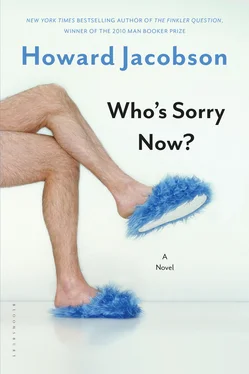It could have turned out differently, even allowing for the inevitable bitterness of marriage to a man who couldn’t walk straight. Had she pursued her own academic interest, followed up her work on the noble savage with a full-blown study of the unseen Negro — the Negro implicit or concealed, actual or mythic — in English life and letters in the eighteenth and nineteenth centuries, she’d have been where the university was at. The very centre of the turning world. And to hell with Kreitman’s now you see me now you don’t. But she was a mother in the making, and anyway, Kreitman was the academic one. Now it was too late. The university is unforgiving of anyone who leaves it for a while, even though its only subjects are post-colonialism, new historicism and women in distress and she was the perfect post-colonial new-historicist woman in distress. Blink and the professors speak another jargon. Alternatively, she could have demanded that Kreitman take her into his firm, once he too parted company from the university, make her chief marketing director or something like that, and have her accompany him to trade fairs and on buying trips to India and Morocco. But she didn’t want the humiliation of seeing him around women. He was beyond any appeal, beyond all reasoning, beyond help. He had no choice in the matter. It was like an illness. A woman moved into his field of vision and Kreitman went as still as a hare on a wintry common. ‘They’re the only things in life that interest you,’ she’d accused him once. But that was wrong. For Kreitman women existed below the level of interest. It was umbilical. He was joined to them in some unfathomable way. A woman had only to stir the air in Peking for Kreitman to become seismic in Brixton Hill.
Best to stay away. In the early days when he came home full of shops she thought she might kill him. Did he not grasp how much she would have liked to be a part of that, the fun of starting out and making anxious progress, like Hansel and Gretel before the big bad accountants got them. She couldn’t pretend she saw what he saw in purses, she didn’t share his passion for narrow openings and suede clefts, but novelty was novelty and she liked their original silly idea that she keep an example of every bag they stocked, a little museum of the heart for them to visit when they were old, the story of their joint adventure. First, she seized upon every new exhibit herself, bringing the children to the shop — look! Daddy on his hands and knees, a bigger baby than both of you, now which bag shall Mummy take? — then she left him to it, less and less curious to sample stock, until at last she ceased caring altogether and bought her own fashion bags, as and when she wanted them, from Fenwick’s. As an act of bitter acrimony she keeps the museum illusion up, keeps receiving the latest styles which he religiously presents as though in honour of some saint whose name they have both forgotten, but now she feels she is building a sarcophagus, collecting memoranda of her own death. Week after week, year after year, she opens the door to their museum and shoves another reliquary inside.
Over it and over it. Only now she is over it.
So Hazel sits in her office supervising the installation of a new joyless Jacuzzi, the relaying of her lawn, inspecting plans for a loft conversion in which, in time, she will resituate her office. Most of her working day is spent airing grievances on the telephone. Should any of her friends need to know the name of someone to complain to they ring Hazel who might even, if they are lucky, do their complaining for them. She has the number of everyone in charge of every conceivable service operation in London. ‘Good morning, Hazel Kreitman here,’ is all she has to say, and you can feel the phones going cold all over the capital.
Of her daughters she said, ‘They get their mental restlessness from their father, their political nous from their grandfather the Cabinet minister, and their determination not to be fucked with from me.’ Anyone meeting Hazel for the first time now would readily have believed that. Not-to-be-fucked-with Hazel. Some laugh that was. When never a day went by when she didn’t catch herself mourning for what she’d been — a lustrous, nervous girl, susceptible, trusting, with all her gifts clutched to her chest like a trousseau, the little fool, in waiting for something terrific to happen to her.
Kreitman, passing her office, catches her in the act of remembering, sees the girlish trousseau she sees, sees her twirling her parasol, sees her at the piano, and apologises. She puts a hand up to stop him.
‘I know this isn’t adequate,’ he says.
‘It isn’t about you,’ she tells him. ‘Are you ever going to understand that? It’s about me.’
About me. Hold on to that. About me.
Over it and over it. Only now she is over it. As her daughters somehow prove.
Though neither was yet twenty, her daughters were already little corporations, bristling with rumour and negotiation, offers and counter-offers, supporting their own websites and employing their own lawyers and accountants. Cressida, at eighteen, with a whole year of art training under her belt, a skylit studio in Hoxton, a studded dog collar round her neck and a mouthful of steel braces she’d designed herself, looked certain to those in the know to spearhead the next generation of Young British Artists. While Juliet at nineteen and three-quarters, and therefore already a has-been to Cressida and her friends, was taking a year off from Oxford to complete (courtesy of her mother’s old research) a socio-sexual history of the Negro woman in the British Isles, with case studies and a section dealing with the iconography of ‘black’ in popular porno, on the strength of a couple of chapters of which she had secured an advance equal in size to the wage bill of a small hospital, though on the tacit understanding that she’d be willing to raise her skirts for the photographers, with or without an iconographic Negro servant in attendance, on the book’s release.
‘Over my dead body!’ Kreitman had protested, but none of the women in his family took the slightest notice of anything he said.
Hazel liked her daughters and got the point of them. They were her without her mistakes, her as she would have liked to be. When Kreitman saw Cressida’s first show in what looked to him like a whore’s bedroom on Old Street — ‘Well, you’d know,’ Hazel said — his first impression was angry bewilderment and his second impression was the same. ‘What the fuck does a daughter of ours know about hand-me-downs?’ he whispered to Hazel.
‘It’s amusing. Just laugh and be proud,’ Hazel told him.
He was proud but he didn’t get the joke. Or, as he would have preferred to put it, he got the joke but didn’t find it funny. He belonged to another time. He thought art had to be big, grand, declamatory, significant, serious, mined from the soul and loaded with meaning. And that you ought to want to spend a long time looking at it. But how long could you spend in front of Cressida’s rickety coat-stands of reach-me-downs and tattered heirlooms? Or in front of the accompanying chromogenic prints on paper, showing little kids looking lost in big kids’ coats? What was there to penetrate? And again he wanted to know what his pampered daughter had ever experienced of hand-me-downs. Under Hazel’s unvarying regime, all items of suspect clothing went into different-coloured baskets, waiting for the sewing woman who came on Thursdays or the Oxfam and sundry charities woman who came on Fridays. If she wanted to ‘sculpt’ clothes, why didn’t Cressida look into her heart and ‘sculpt’ new ones?
‘You’re a fossil,’ Hazel advised him. ‘Go to work.’
Unlike him, she saw the world the way her daughters saw the world. She liked things now. Pity she hadn’t been born a quarter of a century later herself, and grown to be eighteen in the year 2000. Oh, to be quick and slick, whoever and wherever you wanted to be simply on your own say-so. And to be brittle. And astringent. In her day you melted when a fellow took you in his arms. Now any man chancing his mouth with one of her daughters risked ammonia or metal poisoning. Death by a thousand ironies. No wonder Marvin didn’t get what was going on. What was going on was a consequence of him, a rebuttal to his however many thousand years of supremacist patriarchal certainty. ‘Significance,’ he called it. Ha! Hazel knew the significance of ‘significance’.
Читать дальше












